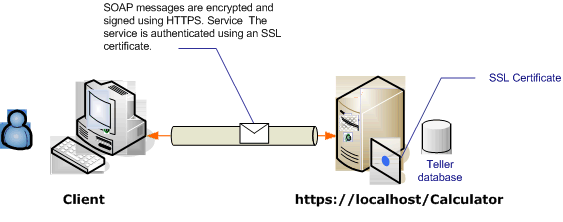Sicurezza del trasporto con un client anonimo
In questo scenario di Windows Communication Foundation (WCF) viene utilizzata la sicurezza del trasporto (HTTPS) per garantirne la riservatezza e l'integrità. È necessario che il server sia autenticato con un certificato SSL (Secure Sockets Layer) e che il client ritenga attendibile il certificato del server. Il client non viene autenticato da alcun meccanismo ed è pertanto anonimo.
Per un'applicazione di esempio, vedere Sicurezza del trasporto WS. Per altre informazioni sulla sicurezza del trasporto, vedere Panoramica della sicurezza del trasporto.
Per altre informazioni sull'uso di un certificato con un servizio, vedere Utilizzo dei certificati e Procedura: Configurare una porta con un certificato SSL.

| Caratteristica | Descrizione |
|---|---|
| Modalità di sicurezza | Trasporto |
| Interoperabilità | Con i servizi Web e i client esistenti |
| Autenticazione (server) Autenticazione (client) |
Sì A livello di applicazione (nessun supporto WCF) |
| Integrità | Sì |
| Riservatezza | Sì |
| Trasporto | HTTPS |
| Binding | WSHttpBinding |
Servizio
Il codice e la configurazione seguenti devono essere eseguiti in modo indipendente. Eseguire una delle operazioni seguenti:
Creare un servizio autonomo usando il codice senza alcuna configurazione.
Creare un servizio usando la configurazione fornita, ma non definire alcun endpoint.
Codice
Nel codice seguente viene illustrato come creare un endpoint utilizzando la protezione del trasporto:
// Create the binding.
WSHttpBinding binding = new WSHttpBinding();
binding.Security.Mode = SecurityMode.Transport;
binding.Security.Transport.ClientCredentialType =
HttpClientCredentialType.None;
// Create the URI for the endpoint.
Uri httpUri = new Uri("https://localhost/Calculator");
// Create the service host and add an endpoint.
ServiceHost myServiceHost =
new ServiceHost(typeof(ServiceModel.Calculator), httpUri);
myServiceHost.AddServiceEndpoint(
typeof(ServiceModel.ICalculator), binding, "");
// Open the service host.
myServiceHost.Open();
Console.WriteLine("Press Enter to exit....");
Console.ReadLine();
// Close the service.
myServiceHost.Close();
' Create the binding.
Dim binding As New WSHttpBinding()
binding.Security.Mode = SecurityMode.Transport
binding.Security.Transport.ClientCredentialType = HttpClientCredentialType.None
' Create the URI for the endpoint.
Dim httpUri As New Uri("https://localhost/Calculator")
' Create the service host and add an endpoint.
Dim myServiceHost As New ServiceHost(GetType(ServiceModel.Calculator), httpUri)
myServiceHost.AddServiceEndpoint(GetType(ServiceModel.ICalculator), binding, "")
' Open the service host.
myServiceHost.Open()
Console.WriteLine("Press Enter to exit....")
Console.ReadLine()
' Close the service.
myServiceHost.Close()
Impostazione
Nel codice seguente viene impostato lo stesso endpoint utilizzando la configurazione. Il client non viene autenticato da alcun meccanismo ed è pertanto anonimo.
<?xml version="1.0" encoding="utf-8"?>
<configuration>
<system.serviceModel>
<services>
<service name="ServiceModel.Calculator">
<endpoint address="https://localhost/Calculator"
binding="wsHttpBinding"
bindingConfiguration="WSHttpBinding_ICalculator"
name="SecuredByTransportEndpoint"
contract="ServiceModel.ICalculator" />
</service>
</services>
<bindings>
<wsHttpBinding>
<binding name="WSHttpBinding_ICalculator">
<security mode="Transport">
<transport clientCredentialType="None" />
</security>
</binding>
</wsHttpBinding>
</bindings>
<client />
</system.serviceModel>
</configuration>
Client
Il codice e la configurazione seguenti devono essere eseguiti in modo indipendente. Eseguire una delle operazioni seguenti:
Creare un client autonomo usando il codice (e il codice client).
Creare un client che non definisce alcun indirizzo di endpoint. Usare invece il costruttore client che accetta il nome della configurazione come argomento. Ad esempio:
CalculatorClient cc = new CalculatorClient("EndpointConfigurationName");Dim cc As New CalculatorClient("EndpointConfigurationName")
Codice
// Create the binding.
WSHttpBinding myBinding = new WSHttpBinding();
myBinding.Security.Mode = SecurityMode.Transport;
myBinding.Security.Transport.ClientCredentialType =
HttpClientCredentialType.None;
// Create the endpoint address. Note that the machine name
// must match the subject or DNS field of the X.509 certificate
// used to authenticate the service.
EndpointAddress ea = new
EndpointAddress("https://machineName/Calculator");
// Create the client. The code for the calculator
// client is not shown here. See the sample applications
// for examples of the calculator code.
CalculatorClient cc =
new CalculatorClient(myBinding, ea);
// Begin using the client.
try
{
cc.Open();
Console.WriteLine(cc.Add(100, 1111));
// Close the client.
cc.Close();
}
' Create the binding.
Dim myBinding As New WSHttpBinding()
myBinding.Security.Mode = SecurityMode.Transport
myBinding.Security.Transport.ClientCredentialType = HttpClientCredentialType.None
' Create the endpoint address. Note that the machine name
' must match the subject or DNS field of the X.509 certificate
' used to authenticate the service.
Dim ea As New EndpointAddress("https://machineName/Calculator")
' Create the client. The code for the calculator
' client is not shown here. See the sample applications
' for examples of the calculator code.
Dim cc As New CalculatorClient(myBinding, ea)
' Begin using the client.
Try
cc.Open()
Console.WriteLine(cc.Add(100, 11))
Console.ReadLine()
' Close the client.
cc.Close()
Catch tex As TimeoutException
Console.WriteLine(tex.Message)
cc.Abort()
Catch cex As CommunicationException
Console.WriteLine(cex.Message)
cc.Abort()
Finally
Console.WriteLine("Closed the client")
Console.ReadLine()
End Try
Impostazione
Per configurare il servizio, è possibile utilizzare la configurazione seguente anziché il codice.
<configuration>
<system.serviceModel>
<bindings>
<wsHttpBinding>
<binding name="WSHttpBinding_ICalculator" >
<security mode="Transport">
<transport clientCredentialType="None" />
</security>
</binding>
</wsHttpBinding>
</bindings>
<client>
<endpoint address="https://machineName/Calculator"
binding="wsHttpBinding"
bindingConfiguration="WSHttpBinding_ICalculator"
contract="ICalculator"
name="WSHttpBinding_ICalculator" />
</client>
</system.serviceModel>
</configuration>